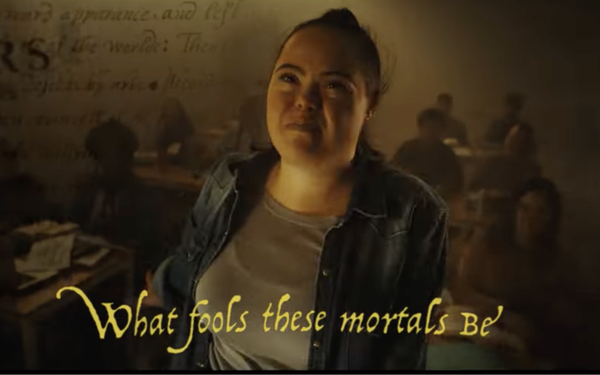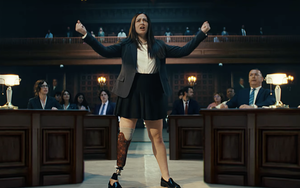
Image above:
"Assume that" people with Down syndrome can learn Shakespeare, argues inclusion-themed video.
Happy May Day!
A year ago, at least, DEI was still resonating with audiences.
Based on percentage increases in average online search volumes, ‘Assume That I Can,” an inclusion-themed video challenging
society’s assumptions about people with Down syndrome, was named America’s most influential ad of the past year by lead-generation firm Skyline Social.
Before the video’s
launch in conjunction with World Down Syndrome Day in March 2024, nonprofit CoorDown had averaged 20 monthly searches, Skyline reports. That jumped to 4,400 searches during the month of the campaign
– a huge 2,850% increase – before dipping to 590 a month later.
advertisement
advertisement
What made the video, created by the Small agency and focusing on inclusion, so effective?
For one
thing, it starred a real person with Down syndrome -- Canadian actress and talk show host Madison Tevlin.
“Hey bartender, you assume that I cannot drink a margarita, so you don't serve
me a margarita,” she begins in a bar setting. “So I don't drink a margarita. Your assumption becomes reality.”
The :90 spot then goes into variations on that theme:
“Parents, you assume that I cannot live on my own, so you don't encourage me to live on my own, so I don't live on my own.”
“Teacher, you assume that I cannot learn
Shakespeare, so you don't teach me Shakespeare, so I don't learn Shakespeare.”
Tevlin then flips the script:
“If all your assumptions become reality, then assume that I
can drink a margarita, so I drink a Margarita.”
“Assume that I can live on my own, so I live on my own.”
And then a bit of humor:
“Assume
that I can learn Shakespeare, so I learn (f***n) Shakespeare. You assumed I can’t swear, right? Assume I can do that job, that I can go to parties, that I can have sex, that I can be on
stage.”
“Assume that I can. So maybe I will.”

While we don’t have numbers yet on its effectiveness, CoorDown
and Small were at it again this March -- with a musical spotfeaturing “Grey’s Anatomy” star Caterina
Scorsone, whose daughter has Down syndrome. Titled “No decision without us,” people with various disabilities insist on being included in such decisions as how a new train station and a
nurses’ supply room should be designed. The ad ends with a woman telling a U.S Senate hearing that new laws “will impact us all” and a man declaring “So give us a seat
too!” Then, everybody sings together, “We want to be where the decisions are made…It’s time for us to be heard loud and clear.”
Another health-related nonprofit
campaign -- "Missed Birthdays," created by adam&eveDDB for the Campaign Against Living Miserably (CALM) -- placed second on
Skyline’s list of 2024’s most influential ads. The poignant 2-minute ad, spotlighting youth suicides, saw brand searches increase 182.4% from 170 the month before its debut last
September to 590 during the campaign, before dipping to 480 a month after, Skyline said.
“These results highlight the impact that emotionally resonant campaigns can have on brand
engagement,” said Skyline CEO-founder Ash Davis in a statement.
And, in light of the fact that an estimated 16% to 18% of people with Down syndrome also have autism and that Health &
Human Services Secretary Robert F. Kennedy Jr. has lately been disparaging the intellectual abilities of the latter, let’s echo the CoorDown ad and hope that those with Down syndrome, autism or
both do get a seat where the decisions affecting their lives are made.